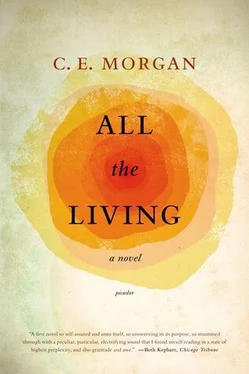The kitchen of the new house was as she remembered it, low-ceilinged and tiled in orange and white. The linoleum floor crackled as she walked across it. The room smelled like the inside of an old drawer and it reminded her fitfully of her uncle’s trailer with its close walls and its spent fluorescent lighting always on the dim. Her lips steeled against each other in dislike.
She drew out random drawers and found more cooking utensils that she’d not seen on her first trip. A small closet housed the hot-water heater and an old spinterish mop. In another, only cleaning supplies smelling of ammonia. Down the small hallway, Aloma passed the bathroom with its louvered blinds and ceramic sink bowl striped with yellow stalagmited water stains. Then a door which she knew to be Cash’s from the guitar posters. And the last room that could only be Emma’s.
She stepped into the dark room, touched by the anemic light that faltered through the blinds. The bed was unmade. A pair of women’s shoes lay at the foot of the bed, one shoe tipped over on its side, its toe toward the door. Aloma stepped into the trapped air, tasted the dust and disuse there, smelled the fading perfume of clothing absent its owner. On the bedside table lay a few bobby pins with their legs crossed, a hairbrush, a tiny New Testament, and a framed photograph of Orren held upside down by his older teenaged brother, who gripped him like an up-ended shoat about the middle. Orren’s hair fell straight down from his head, his ridiculous grin was a frown.
She took it up in her hands and turned around to carry it to the window in the hallway where she could see it better, but as she turned she felt rather than heard Orren move into the room. Aloma started and nearly dropped the frame. Then she could not decide if she should return the photo to its bedside post or leave and she wanted to do both. Instead, she walked toward Orren quickly, less from a desire to go to him than to keep him from coming farther into the room.
What are you doing? he said.
She was almost under his chin when she stopped, nerves whisked the moist out of her mouth. Well, she said, I had an idea. Something I want to ask you about.
Looks to me like you come to some kind of decision all by your own self.
No, she said. It’s just you all were busy and I didn’t—
That ain’t your picture.
She looked down at the frame in her hand. Orren, she said, but the words did not follow on his name. He waited, seemed to be coming toward her when he had not moved at all.
Orren, she started again and stepped away from him to put the picture down on a nearby bookshelf so Orren’s own young face turned out happily to the small room. I thought we might could rent this place out. Make some money for the farm. You work so hard and—
This is their house, he said.
Well, I know — she said and there was a soft desperation in her voice that even she could hear.
I ain’t never asked you to come down here.
You did so, she said louder, trying her best to rein in the anger in her voice, and she meant not the newer house, but the whole of the farm and his life.
This ain’t your house, he said again.
I know, Orren, but I live here now.
You don’t live here , he snapped and he stepped up and grasped her hand hard then and he pulled her roughly toward the hall where a small window faced southwest and he raised a forearm and she saw that the muscles of his arm shook as he did this. You live there, he said and his voice chilled her along the length of her spine. He pointed toward the big house. There, he said again.
She didn’t look at the house. She looked at him. Emma and Cash don’t live here anymore, Orren, Aloma said. They’re dead. A silence divided the air between them and neither of them moved even when they felt its cold. She watched as Orren’s eyes changed so that they looked past her, through her to the room she stood in and she hated it the instant she saw it, the emptiness she didn’t know but might one day come to know. She preferred a yelling to the apparition of life she saw there now. She wanted to wrench her arm away, but she was cautious, she pulled her arm away from his grasp gently as if he were sleeping and she did not want to wake him. And because she could not bear to see his eyes like that, she walked past him out the door and as she stepped out into the dying day, her shadow cast back toward the building, stretching out interminably until it became just a spear thin enough to break.
She’d kept her temper in her mouth, but her ire was up and rising. Aloma marched straight into the house, up the stairs, tearing off her clothes as she went to stand trembling under the cold shower. She shook there with a kind of stupefied, grieved hate for her life. She did not even soap herself, but watched as the water rinsed the dust of the new house, of the fields, from her arms and legs, from her calloused feet. Then with her face drawn to a bitter point, she dressed in one of her old school tee shirts and a pair of tattered shorts and went back down to the kitchen. She was ready to fight, the tiny bones of her fingers trembled.
But Orren did not come to fight. Aloma wrenched open the door and saw nothing but the heated gloaming, the sun’s wake, the great red swaths that spoke of its passage. She had refused to look behind her as she left the little house, so she had not seen where Orren had gone. That he was coming back there was no doubt. But she could not force herself to eat so she sat uselessly in a kitchen lit by a sun that was already gone, her feet aggravating the floor. And yet as the hour slagged toward supper and past and still he had not come in, she allowed herself to imagine for a moment what it might be for him not to come back at all. Her mind fretted around the idea. Then, as a kind of retributive punishment, she permitted herself the memory of the last look on his face before she had walked out.
When the light in the room was finally damped by darkness, Aloma rose and switched on the single naked bulb by the stove. She dumped chicken into grease without flouring it and let it heat to a fry with no intention of eating it, only a vague wish to busy her hands. She stood in the small round of light created by the incandescent bulb. Every evening was like this, the night taking the day with no clear demarcation of its passing so she could not mark the precise moment when night arrived again. It took her continually by surprise and she had grown to hate that.
Aloma left the stove and the sounds of the grease popping and sizzling and stood on the back steps. Even in the full dark, the farthest fields disappeared against the shadow of the mountains, dark as night, darker even. She waited for the uneven signaling of lightning bugs among the plants. The tractor stood in silhouette at the gate nearest the house and she detected the passing flutter of bats above her as they sloped about the eaves. The smell of the frying chicken was warm and yeasty as it moved past her into the clean smell of the outdoors. Beyond the steps, she could smell only the grass and beyond it, perhaps, the first hint of cut plants in their nascent decay. She thought to turn around and return to the yellow light of the kitchen, but she sat where she was, unable to care suddenly if the chicken burnt to a crisp in the oil. She felt the heat behind her and the cooler air before her, and pressed between the two, she could not move. Her hands lay like pale empty baskets on her thighs. She closed her eyes, her back bowed. He would come back, he would come back.
The smell of a cigarette drifted to her. Then she heard Orren approaching from the other side of the house. When he turned the corner of the house and saw her, he paused and then leaned against the house itself, watching her.
Where have you been? she said, low and tight.
Читать дальше
Конец ознакомительного отрывка
Купить книгу











